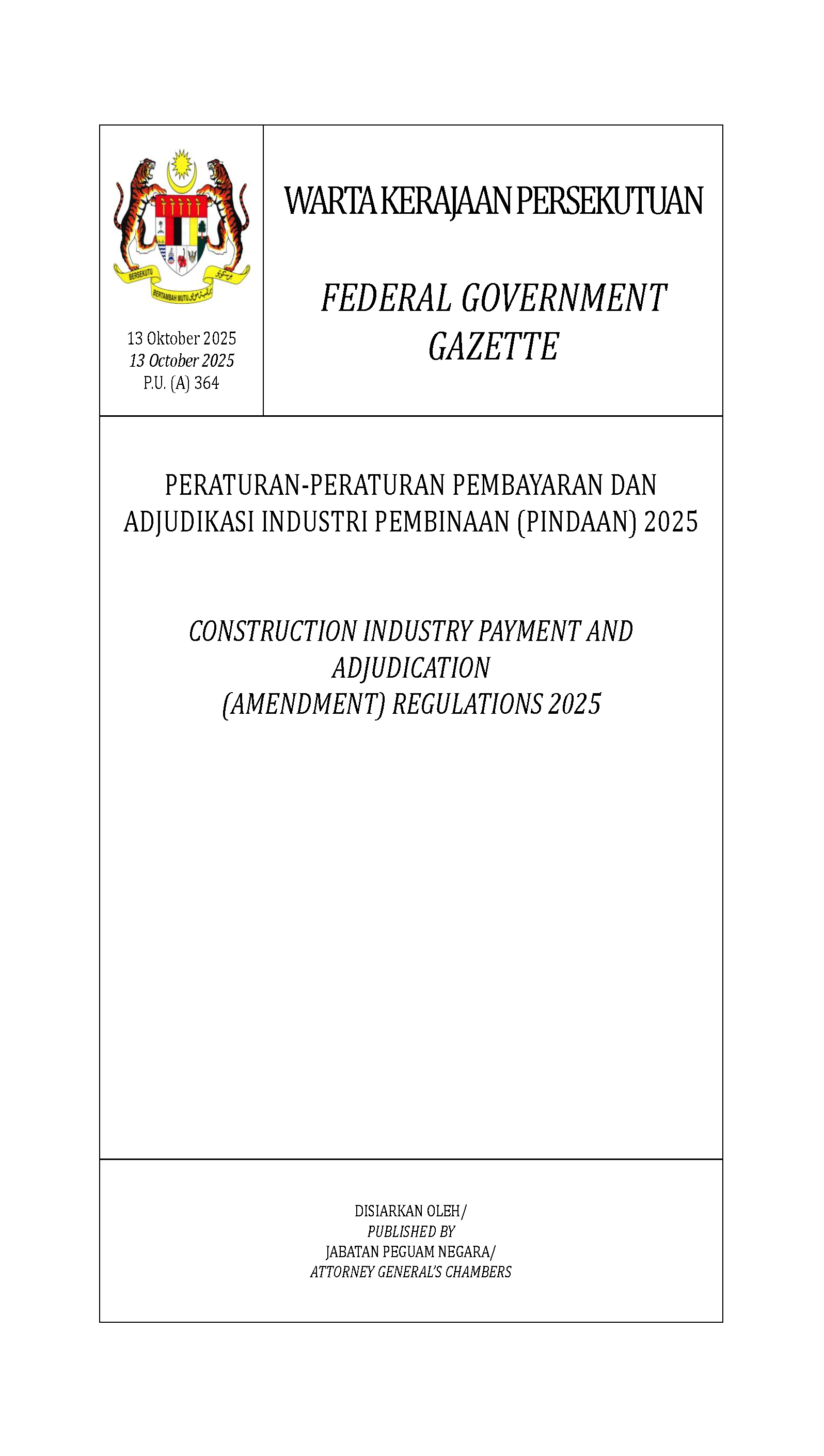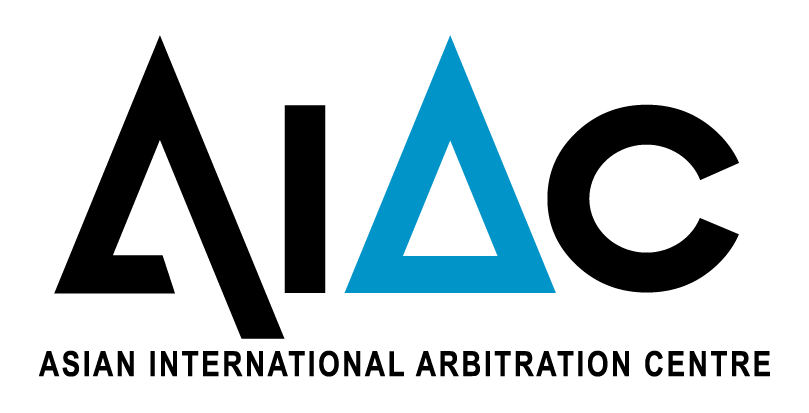The unswerving growth of the construction industry in Malaysia that has been dominantly driven by the patronage of the Economic Transformation Programme in Malaysia has given rise to several construction-related disputes. To address these problems, the Construction Industry Payment & Adjudication Act 2012 (Act 746) ("CIPAA") was enacted by Parliament and came into operation on 15th April 2014.
The Construction Industry Payment and Adjudication Regulations 2014 and the Construction Industry Payment and Adjudication (Exemption) Order 2014 were both also implemented on 15th April 2014 to complement CIPAA 2012. CIPAA proceedings are a summary procedure intended to reduce payment defaults by establishing a cheaper and speedier system of dispute resolution for construction contracts in respect of work done and services rendered, providing for the recovery of payment upon the conclusion of the adjudication process in addition to a host of other remedies such as the right to reduce the rate of work progress or to suspend work or the securing of direct payment from the principal.
Adjudication of a construction dispute under CIPAA will be presided over by a neutral and impartial adjudicator appointed by the AIAC, who possesses a highly experienced background in the construction law and industry fields, relevant to the dispute's subject matter. The said adjudicator shall conclude the proceedings by providing their adjudication decision that will be immediately binding on the parties, pending the final resolution of the subject matter of the dispute by arbitration, litigation or agreement between the parties.
Since the inception of CIPAA, AIAC has administered over 1,400 adjudication cases with 2017 recording the highest number of adjudication cases with a total number of 708 cases alone. In carrying out its duty as the adjudication authority, AIAC also regularly conducts adjudication training programmes as part of the AIAC's efforts to regulate and maintain the high standards of competency expected of Malaysian adjudicators.
The professional competency training and accreditation of adjudicators via the AIAC Certificate in Adjudication Programme ensures that the adjudication panel administered by the AIAC shall only consist of experienced experts and professionals equipped with the necessary knowledge of substantive laws provided under CIPAA 2012 & CIPAA Regulations, the practice and procedure of the adjudication process, fundamentals of construction law and specific technicalities of the construction industry processes consisting of procurement, contractual documentation and agreements.
Procedure – Adjudication under CIPAA
The process starting from the dispute until the adjudication decision is as follows:
- Claim of Payment – Sec. 5, CIPAA – to be served by the unpaid party on the non-paying party
- Payment Response – Sec. 6, CIPAA – to be served by the non-paying party to the unpaid party (within 10 working days). A party who admits to the claim shall state the whole amount claimed or any amount as admitted while one who disputes the claim shall state the amount disputed and the reason for the dispute.
- Adjudication Notice – Sec. 7 & 8, CIPAA – to be served together with any supporting document by the claimant on the respondent (within 5 working days)
- Appointment of Adjudicator: – Sec. 21 & 23, CIPAA – may be by agreement of the parties in dispute (within 10 working days from the service of the notice of adjudication) or by the Director of the AIAC upon the request of both parties or by either party in dispute if there is no agreement by both parties in the appointment (within 5 working days upon the receipt of a request)
- Terms of appointment – Sec. 22 & 23, CIPAA – to be negotiated and agreed with the adjudicator (within 10 working days, after which the parties or the Director of the AIAC may proceed to appoint a new adjudicator)
- Adjudication Claim – Sec. 9, CIPAA – to be served together with any supporting documents by the claimant on the respondent and the adjudicator (within 10 working days)
- Adjudication Response – Sec. 10, CIPAA – to be served together with any supporting documents by the respondent on the claimant and the adjudicator (within 10 working days).
- Adjudication Reply – Sec. 11, CIPAA – to be served with any supporting documents by the claimant on the respondent and the adjudicator (within 5 working days)
- Representation – Sec. 8, CIPAA – parties may be self-represented or be represented by any party appointed by them, including solicitors
- Adjudication proceedings – Sec. 25, CIPAA – to be conducted according to the directions of the adjudicator, which may or may not involve oral evidence
- Decision – Sec. 12, CIPAA – to be delivered within 45 working days from the service of adjudication response or reply, whichever later; or if no adjudication response is received, 45 working days from the expiry of the prescribed period for the adjudication response; or such further time as agreed to by the parties.
The adjudication proceeding is binding unless it is set aside by the High Court, the matter is settled by both parties in writing, the dispute is finally decided by arbitration or the court, or there is a stay of adjudication decision pursuant to Sec. 13 and 16, CIPAA. If either or both parties do not agree with the adjudication decision, the case can be reopened by arbitration or litigation at the conclusion or termination of the construction contract.
Scope of CIPAA
- Only disputes relating to payment for work done and services rendered under the express terms of a construction contract may be referred to adjudication under CIPAA. However, the parties may agree after the appointment of the adjudicator to extend the jurisdiction of the adjudicator to decide on any other matter arising from the construction contract.
- Sec. 41, CIPAA provides:
"Nothing in this Act shall affect any proceedings relating to any payment dispute under a construction contract which had been commenced in any court or arbitration before the coming into operation of this Act." - For the purposes of administration of adjudication cases by the AIAC under CIPAA, including the appointment of an adjudicator under CIPAA, the AIAC takes the position that CIPAA applies to a payment dispute which arose under a construction contract on or after 15.4.2014, regardless of whether the relevant construction contract was made before or after 15.4.2014. In this regard, a payment dispute under a construction contract is said to have arisen when the non-paying party has, in breach of the contract, failed to make payment by the contractual due date for payment.
- CIPAA applies to every 'construction contract' made in writing relating to construction work carried out wholly or partly in Malaysia, including a construction contract entered into by the Government. It applies to both local and international contracts, provided the subject construction work is carried out wholly or partly in Malaysia.
- CIPAA defines 'construction contract' to include construction work contracts and consultancy services contracts.
- CIPAA only applies to contracts which are made "in writing". However, no definition or elaboration is provided in CIPAA as to what constitutes construction contract made in writing. AIAC considers that a construction contract must be wholly in writing, and that it is made in writing:-
– if the contract is made in writing (whether or not it is signed by the parties);
– if the contract is made by exchange of communications in writing; or
– if the contract is evidenced in writing. - Where parties agree otherwise than in writing by reference to terms which are in writing, they make a contract in writing. A contract is evidenced in writing if a contract made otherwise than in writing is recorded by one of the parties, or by a third party, with the authority of the parties to the contract.
- The Act applies equally to the Government of Malaysia as well as the Private Sector. However, pursuant to the Construction Industry Payment and Adjudication (Exemption) Order 2014, two categories of Government construction contracts are exempted. The first category of Government construction contracts are contained in the First Schedule of the Exemption order namely a contract for any construction works that involve emergency, unforeseen circumstances and that relate to national security or security related facilities. The second category of Government construction contracts are contained in the Second Schedule of the Exemption order namely construction contracts with the Government of the contract sum of twenty million ringgit (RM20,000,000) and below. With regards to this second category, the exemption order merely exempts these contracts from the application of subsections 6(3), 7(2), 10(1), 10(2), 11(1) and 11(2) of CIPAA 2012, and relates to the timeline for submissions and replaced with a set of longer timelines for such submissions. It is also a temporary exemption from 15 April 2014 to 31 December 2015 for this second category. However, the exemption order does not extend to construction contracts to which the Government is not a party.
- CIPAA does not apply to an individual owner i.e. resident, who erects a building not more than four-storeys high which is wholly intended for his own occupation.

Construction Industry Payment and Adjudication Act 2012
Includes :
- Construction Industry Payment and Adjudication Regulations 2014
- Construction Industry Payment and Adjudication (Exemption) Order 2014
- AIAC Adjudication Rules & Procedure
- AIAC Circulars
- Guide to CIPA 2012
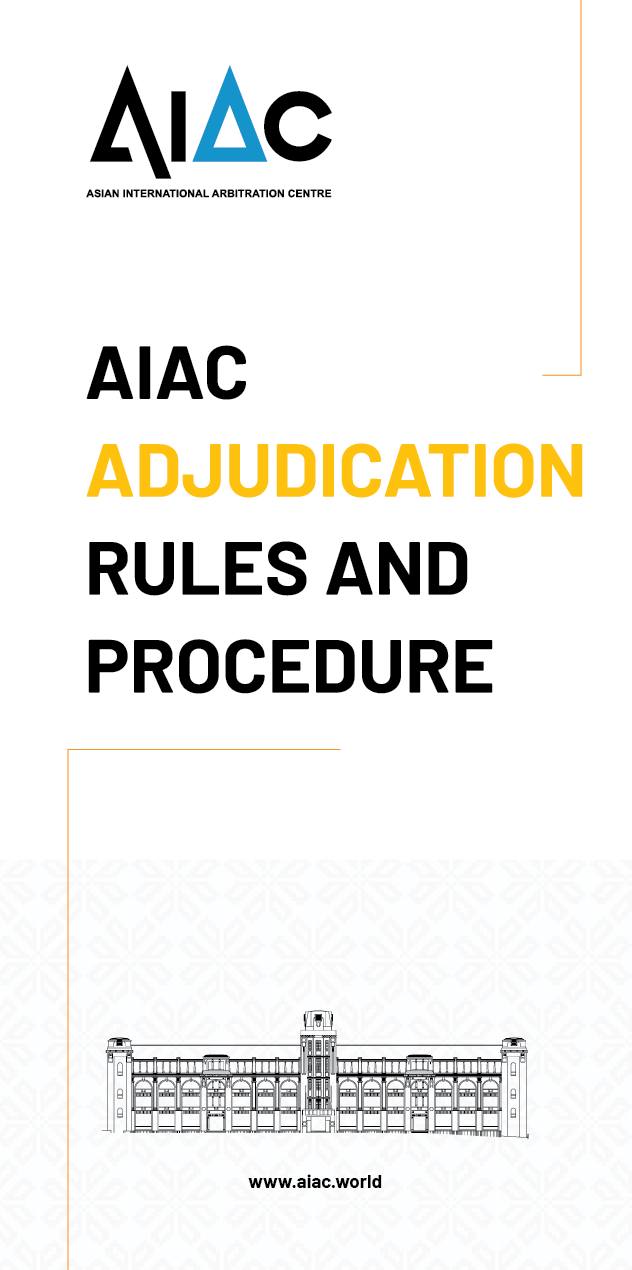
AIAC Adjudication Rules and Procedure
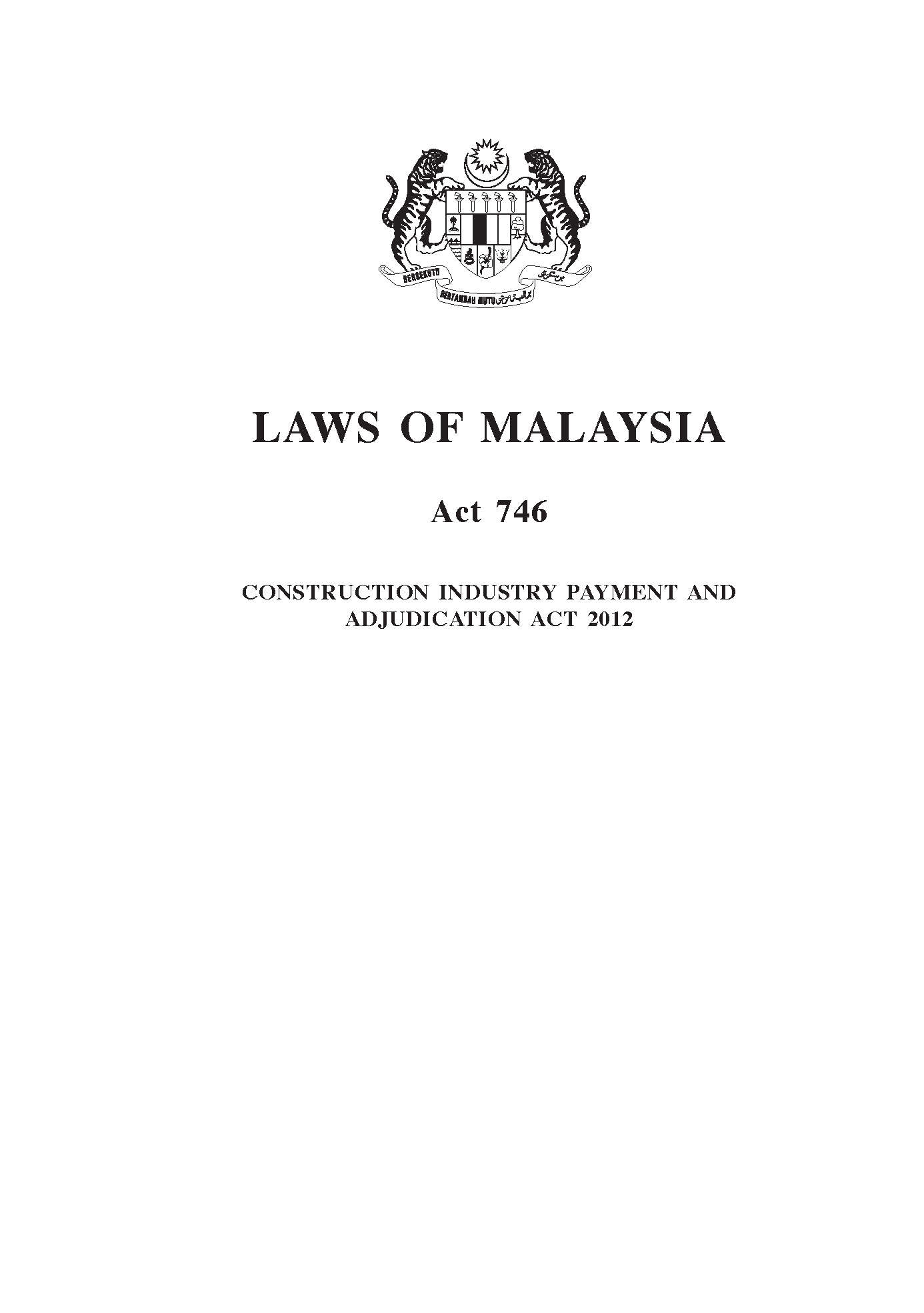
Construction Industry Payment and Adjudication Act 2012 [Act 746]
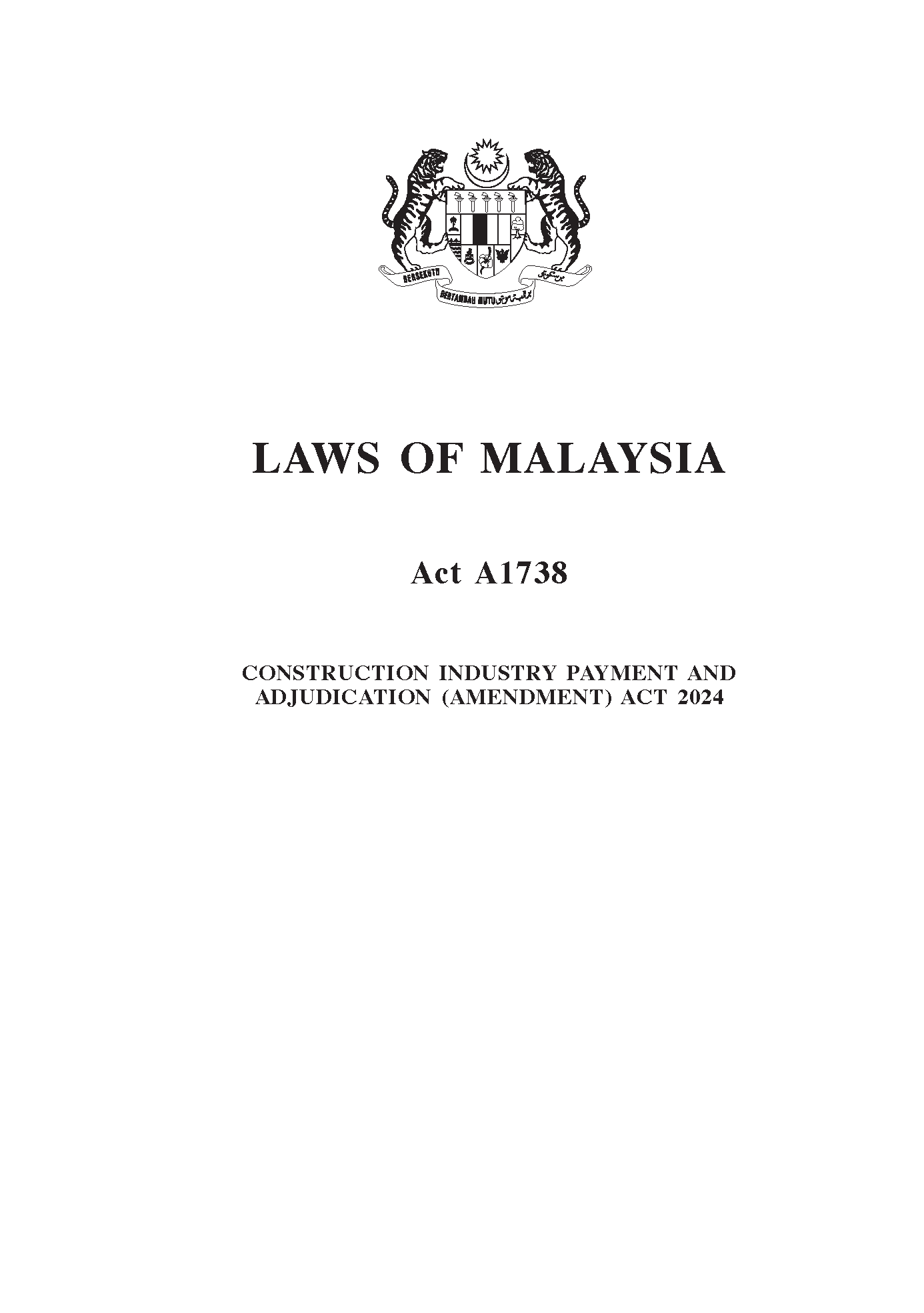
Construction Industry Payment and Adjudication (Amendment) Act 2024 [Act A1738]
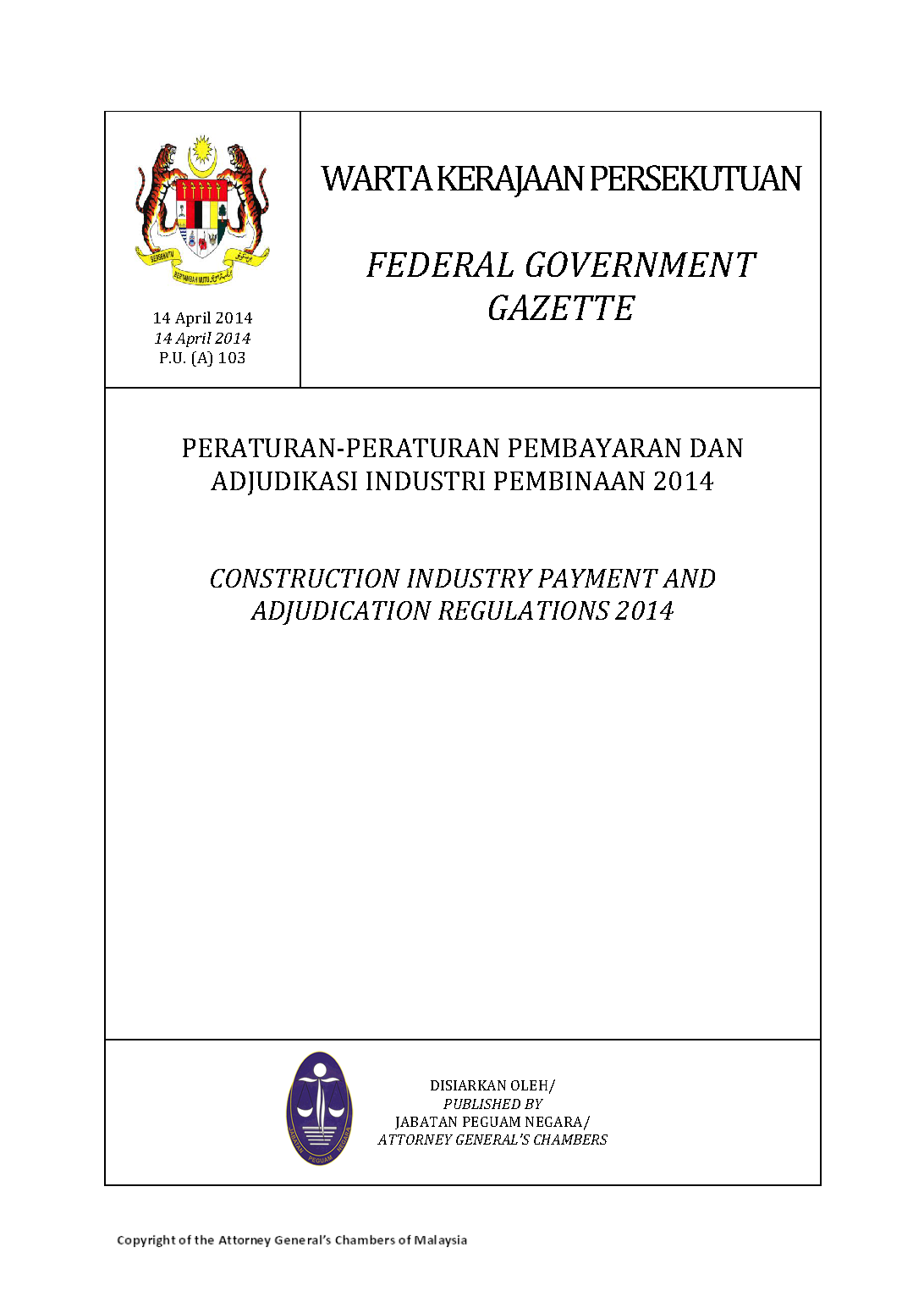
Construction Industry Payment and Adjudication Regulations 2014 [P.U.(A) 103/2014]
